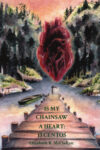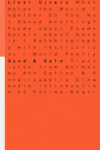
[Discount Guillotine; 2025]
This collection’s title performs one of the book’s chief concerns: ambiguity. The girl of the title is shaped like a battalion, but we might also read the words as signifying a girl who has been shaped by a battalion. The speakers of Temperance Aghamohammadi’s poems are barbed and weaponed multiplicities, but they are also often under threat from violent outside forces. In this debut, ferocity and vulnerability are entwined. Twoness, threeness, manyness—these are the currents that infuse the book with its magick and its charm, that erupt from the text as oracular explosions of ecstatic possibility. Aghamohammadi, a trans Iranian-American poet and self-described “Acolyte of the Exquisite,” says, in an interview: “I believe that fully showing up as yourself, and radically more, creates the groundwork for an infinite amount of possible futures.” “Radically more” is key in Battalion Shaped Girl, where abundance and overload prevail.
One of the book’s epigraphs is sourced from the Austro-British analytic philosopher Ludwig Wittgenstein’s Tractatus Logico-Philosophicus: “Not how the world is, is the mystical, but that it is.” This intertext is useful for approaching Aghamohammadi’s poems, which seem to almost defy Wittgenstein in their attempts to utter the unutterable beingness of the world, and of being in the world. The title of her poem “The Subject Does Not Belong,” which is also sourced from Wittgenstein, bleeds into a Wittgenstein epigraph: “…to the world but it is a limit of the world.” A few lines later in the Tractatus, Wittgenstein writes that “[e]verything we see could also be otherwise,” and this feels like a guiding principle in the world of Battalion Shaped Girl, where utterance is bringing into being, a boon to becoming. Prophecy is not so much an epistemological endeavor as it is a mode of existence.
Aghamohammadi’s poetics seems to be very much invested in showing, demonstration, indication. In “Fetish IV,” one of five “Fetish” poems scattered throughout the book, the poet writes: “You are that girl. Torqued. Out. Dismissed. Ms. This.” “Ms. This” is an apt appellation, a cheeky configuration of the speaker-seer-saint as one who points, presents, produces—like the hand issuing forth from a cloud in the Tarot. “No, look here, and here and here and here,” Aghamohammadi seems to insist. The speaker in “Fetish IV” and elsewhere is a medium, an open channel, and their prescience is a function of music. In “Shadow Puppet,” the speaker tells us, “I know. The future. / Is memory. / I pull / taut / into a vibrating / string.” The enjambment and jagged syntax create a sense that the speaker is both the vibrating string and the hand that has plucked it.
When you hear the invisible, you behold it
Underground, they, too, bend their ears up to listen to behold
Yes, what you have lived is your entire life
Lord, I have lived my entire life, an instrument
For Aghamohammadi, sensory input is more than data; it is life’s performance of a song by way of you. It’s the means by which the dead exert themselves in the present.
Time is not singular in Battalion Shaped Girl. Music becomes its own prophecy, its own elegy. “[T]his song will come / to pass,” Aghamohammadi writes in “Die Fuge.” Existence and non-existence are bound up in one another. The heard song cannot help but imply its own end. And being, too, is multifarious. In an 1871 letter to Paul Demeny, the poet Arthur Rimbaud wrote, “Je est un autre.” I is another, as Aghamohammadi shows us in “Matryoshka,” the opening poem of the book’s first section:
how to be a knife.
before night. I burn milk
thistle. a lock
of my hair.
ambergris.
an other me
claws out
of my throat.
wet. blessed.
babbling.
she’s the real one.
until another
slinks out.
This is self-birth through music, through spell, Russian nesting dolls tumbling open to alternative iterations. The risk and the glory of song is the production of unanticipated selves. One definition of battalion is “a large, organized group of people pursuing a common aim or sharing a major undertaking.” Elsewhere in the book:
Made friends with his cat. Had stale rye toast with the apricot jam. He loved. Late April. My way out of (radical state change). He said. His bedroom was haunted. No. Just him. All of. I. Know these things. So many see magick when they should be seeing shame. A ghost. How a ghost]
“All of. I. Know these things.” The poet’s voice comes at you like a chord: harmonic, discordant, both. And the syntax augments this effect, for many of the book’s poems are loaded up with these periods that lend it a halting, incantatory effect, a shortness of breath, obsession. Meter here becomes a tool for divination and evocation. But of course language can also be weaponized in order to conceal, obfuscate, falsify, as Aghamohammadi demonstrates in “There Are No Sound Machines,” a poem that interrogates the suspicious and likely murderous circumstances of Mahsa Amini’s death in Tehran in September 2022, after she was arrested by the Iranian government’s Guidance Patrol:
Mahsa Amini “died in custody”
when the morality police deemed her hijab not properly
worn
Rephrase to summon the truth
The police murdered her
Syntax is a disruptor
“was discovered dead” or “killed”
They have/are killed/killing one/so many
Aghamohammadi seems suspicious of totalizing grammars; she opts instead for syntaxes that branch, spiral, recur, blossom and fracture.
And this branching, too, shows up in the book’s navigation of desire, eros, gender. In “Niloofar,” the speaker tells us that “[w]ith bewitched / silver shears / I sever / fate’s stamen / from its pollinating / bee.” Transness is presented as a kind of visionary and botanical ontological ritual, a severing of one future and a blossoming of another. The poet writes, in “Adored, A Door”:
Transness cleaves me. From the world I have always shamefully wanted. When I am apprehended. Every day. Silence is such an awful stone. I’m between the isolation of the branches. I do want to be in love. But I confuse love. With understanding.
There is a tension here among the valences of “apprehension,” which can mean both understanding and capture. It is within these interstitial linguistic zones that Aghamohammadi stages many of the book’s conflicts. The poems leverage the slipperiness of language in order to put immense erotic pressure on the material world, so that, in “Cinéma Du Look” for example, a motel’s corny and formulaic heart-shaped bed dissolves and is reconstituted as “a heart-shaped breath.” Through her deployment of seemingly impossible images, Aghamohammadi makes visible the alchemical machinations of desire, exposing a stranger plane of being just beyond the surface of the ordinary.
For all this abstraction, mutation of image, and reenvisioning, Battalion Shaped Girl is mediated by existence on Earth. The poems are lived-in, their speakers flickering through bedrooms and rooftop bars and rural desolations. History, myth, and state-sponsored violence haunt the poems, trouble their erotic abundance. The text is adorned with gorgons, senators, the names of those to be executed chanted over a loudspeaker at Evin Prison in Iran, the story of Farhad and Shirin, early industrialists, urban design, Saint Winifred, and Lacan. And this worldliness is sometimes attended by weariness, for Aghamohammadi does not shy away from the limits and failures of poetry: “Somehow, I can’t prevent the worst of the world from happening. I count the protection spells I know on one hand. I go to sleep. My life is happening again” (“Adored, A Door”). And later, in the same poem: “God has answered a question I never posed. This could be a problem.” Here Aghamohammadi, in a rare moment of near-despair, considers the perils of being a conduit, the price of a vision you did not request nor could you have ever anticipated. And that sudden “problem,” whatever it may turn out to be, is the price of existing at the threshold of the future, for Battalion Shaped Girl transmits the uncanny sense that the future is pouring into you. The speakers of these poems don’t predict the future; they present themselves as open floodgates for the churning yet-to-be. Reading this book is to feel that something—everything—is about to happen, has already happened, is happening again right now.
Alex Tretbar wrote the chapbooks According to the Plat Thereof (Ethel, 2025) and Kansas CityGothic (Broken Sleep, 2025). He works in the Center for Digital and Public Humanities at the University of Missouri–Kansas City, where he is currently studying the archive of early issues of New Letters (1934-1951) and assisting with the Kansas City Monuments Coalition. Recent poems, fiction, and nonfiction appear or are forthcoming in Annulet, Bat City Review, Callaloo, Chicago Review, Denver Quarterly, Fence, ISSUE, mercury firs, NOIR SAUNA, VOLT, Works & Days, and elsewhere.
This post may contain affiliate links.






